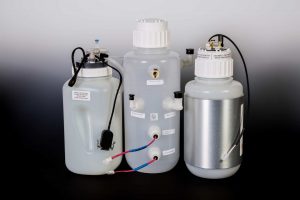Material Choices for Nalgene® Bottles & Carboys
An Original Equipment Manufacturer’s (OEM) design may require a modification to a plastic bottle or carboy such as drilling holes in the cap or perhaps marking or labeling the bottle in some way. Piedmont CMG is able to acquire any plastic bottle or carboy that is readily available from a manufacturer or distributor and make the required modifications to the customer’s exact specifications.
Highest Quality Material Sources
Piedmont CMG sources our bottles and carboys from Thermo Scientific™ Nalgene™. Nalgene™ bottles are the #1 choice for bottles and carboys used in the Life Sciences industry. They are made in the USA using the highest quality plastic resins that meet pharmaceutical and laboratory grade standards.
Nalgene bottles and carboys contain far lower concentrations of trace element extractables and potential leachables than glass and they are a safe and shatterproof alternative to glass.
Nalgene offers containers for virtually any application and they are made from a variety of plastic types. HDPE, LDPE, PP and FLPE bottles are available for chemical resistance. If sterilization is a requirement, autoclavable PC, PP, and PMP bottles are an option. For maximum chemical resistance and tolerance to temperature PFA and FEP bottles are offered.
High Quality Plastic Resin Advantages
Polyolefins
Low-Density Polyethylene (LDPE)
- High Molecular Weight Hydrocarbon
- No Known Solvent at Room Temperature
- Chemically Inert
High-Density Polyethylene (HDPE)
- High Molecular Weight Hydrocarbon
- No Known Solvent at Room Temperature
- Chemically Inert
- More Rigid and Less Permeable than LDPE
Polypropylene (PP)
- Autoclavable
- No Known Solvent at Room Temperature
- Best Stress Crack Resistance of the Polyolefins
Polymethylpentene (PMP)
- Autoclavable (Withstands Repeatable Autoclaving)
- Excellent High Temperature and Chemical Resistance
- Excellent Transparency and Rigidity
Engineering Resins
Polycarbonate (PC)
- Autoclavable
- Window Clear
- Amazingly Strong and Rigid
- Non-Toxic
- Toughest of All Thermoplastics
Polyethylene Terephthalate G Copolymer (PETG/PET)
- Glass-Like Clarity
- Excellent Gas-Barrier Properties
- Outstanding for Storing Biologicals
- Non-Cytotoxic
- Sterilization with Radiation or Compatible Chemicals
Sterilization of Containers
Autoclaving is the preferred method for sterilizing Nalgene containers made of select resins.
Autoclavable resins include:
- Polycarbonate
- Polymethylpentene
- Polypropylene
- Polypropylene Copolymer
- Teflon FEP and Teflon PFA
DNase and RNase enzymes break down DNA and RNA. They are contaminants that can interfere with nucleotide research. Nalgene recommends autoclaving to destroy DNase and offers further techniques to inhibit or remove RNase from their plastic containers.
Available bottle weights include light weight economy, standard weight laboratory quality, or high density packaging bottles.
The Nalgene manufacturing facilities are ISO 13485:2003 registered and their containers meet RoHS and USP Class VI standards.

